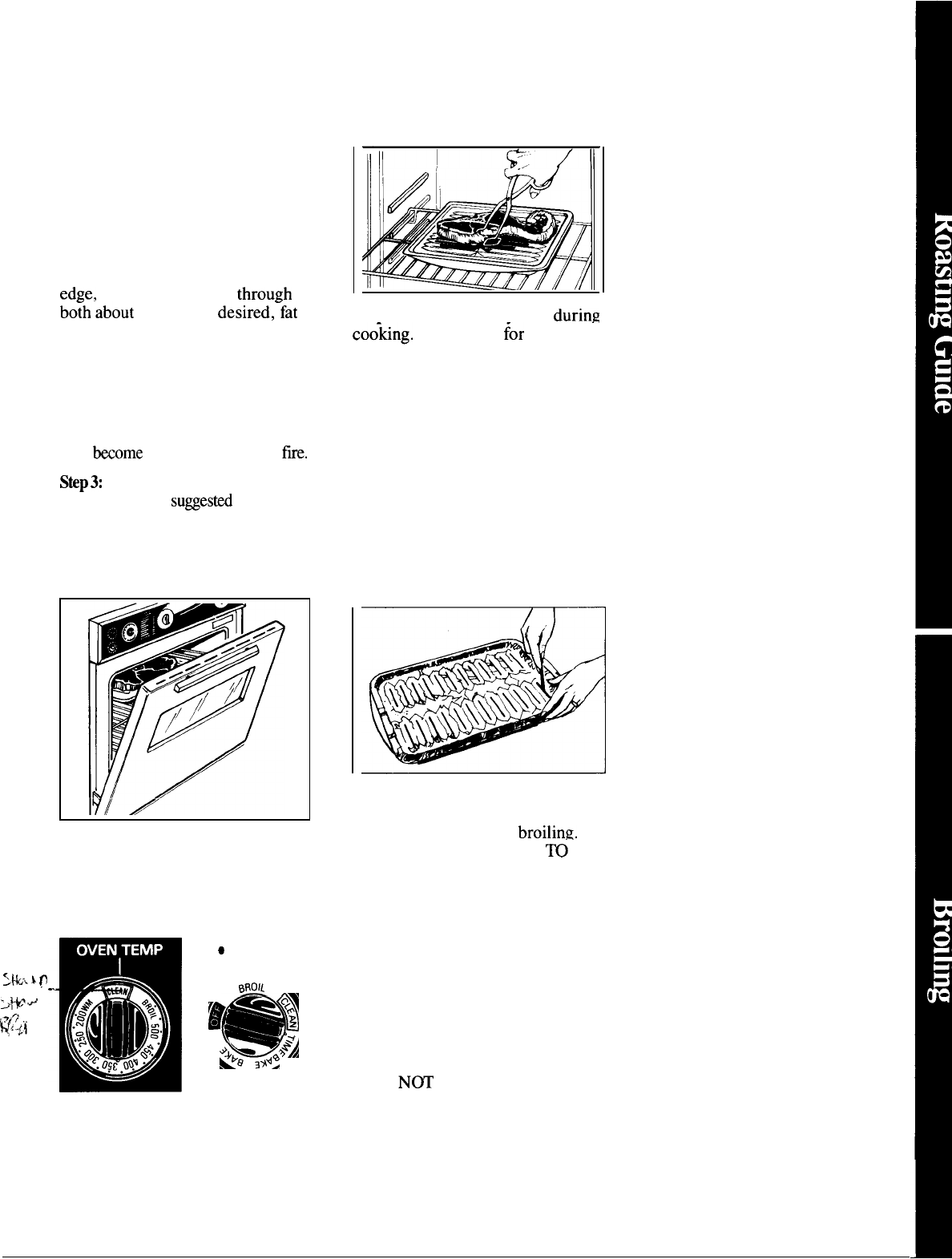
Broiling
See Broiling Guide on page 17.
Broiling is cooking food by intense
radiant heat from the upper unit in
the oven. Most fish and tender cuts
of meat can be broiled. Follow
these steps to keep spattering and
smoking to a minimum.
Step
1:
If meat has fat or gristle near
edge,
cut vertical slashes
through
bo~h”about
2“ apart. If
desired,-fat
Step 6: Turn food only once
during
may be trimmed, leaving layer
about 1/8” thick.
Step 2: Place meat on broiler rack
in broiler pan which comes with
range. Always use rack so fat drips
into broiler pan; otherwise juices
may
kome
hot enough to catch
fu-e.
Step3:
Position shelf on recommended
shelf position as
su~ested
in Broiling
Guide on page 17. Most broiling is
done on C position, but if your
range is connected to 208 volts, you
coo-ting.
Time foods
~or
first side
-
per Broiling Guide.
Turn food, then use times given for
second side as a guide to preferred
doneness. (Where two thicknesses
and times are given together, use
first times given for thinnest food.)
Step
7: Turn OVEN SET knob
to OFF. Serve food immediately,
and leave pan outside oven to cool
during meal for easiest cleaning.
may wish to use higher position.
Use of Aluminum Foil
1. If desired, broiler pan maybe
lined with foil and broiler rack may
be covered with foil for
broiling.
Step 4:
Leave door ajar a few inches
(except when broiling chicken).
ALWAYS BE CERTAIN
~
-
The door stays open by itself, yet
MOLD FOIL THOROUGHLY TO
the proper temperature is maintained
BROILER RACK, AND SLIT
in the oven.
FOIL TO CONFORM WITH
SLITS IN RACK. Broiler rack is
>kL,.
k
p
,.. .
>ti~~
~~ii i-
❑
0
designed to minimize smoking and
spattering, and to keep drippings
BROIL
cool during broiling. Stopping fat
@
t
-9$
and meat juices from draining to
z
the broiler pan prevents rack from
serving its purpose, and juices may
>+”
*~>3ydQ
become hot enough to catch fire.
2. DO
N~
place a sheet of
—
Step 5:
Turn both OVEN SET and
aluminum foil on shelf. To do so
OVEN TEMP knobs to BROIL.
may result in improperly cooked
Preheating units is not necessary.
foods, damage to oven finish and
(See notes in Broiling Guide.)
increase in heat on outside surfaces
of the oven.
Questions &Answers
Q. Why should I leave the door
closed when broiling chicken?
A. Chicken is the only food
recommended for closed-door
broiling. This is because chicken is
relatively thicker than other foods
you broil. Closing the door holds
more heat in the oven which allows
chicken to cook evenly throughout.
Q. When broiling, is it necessary
to always use a rack in the pan?
A. Yes.
Using the rack suspends
the meat over the pan. As the meat
cooks, the juices fall into the pan,
thus keeping meat drier. Juices
are protected by the rack and stay
cooler, thus preventing excessive
spatter and smoking.
Q.
Should I salt the meat before
broiling?
A. No.
Salt draws out the juices
and allows them to evaporate.
Always salt after cooking. Turn
meat with tongs; piercing meat
with a fork also allows juices to
escape. When broiling poultry
or fish, brush each side often
with butter.
Q.
Why are my meats not turning
out as brown as they should?
A. In some areas, the power
(voltage) to the range maybe low.
In these cases, preheat the broil
unit for 10 minutes before placing
broiler pan with food in oven.
Check to see if you are using the
recommended shelf position. Broil
for longest period of time indicated
in the Broiling Guide. Turn food
only once during broiling.
Q.
Do I need to grease my broiler
rack to prevent meat from sticking?
A. No. The broiler rack is designed
to reflect broiler heat, thus keeping
the surface cool enough to prevent
meat sticking to the surface. However,
spraying the broiler rack lightly with
a vegetable cooking spray before
cooking will make cleanup easier.
15


















